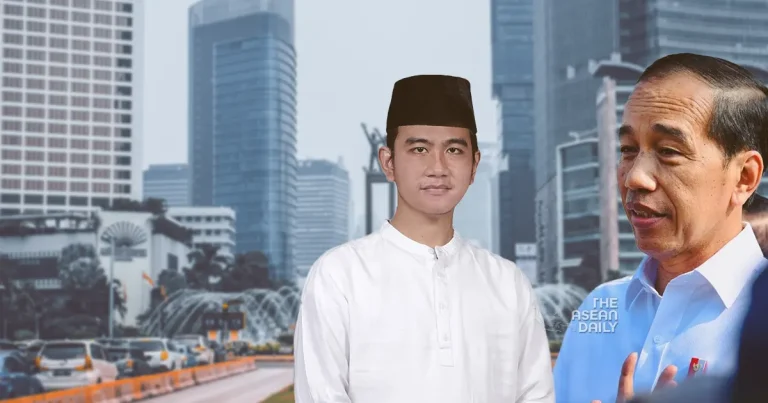17-10-2023 (JAKARTA) Indonesia is facing a wave of criticism, with dissenting voices even emerging from within the judicial system itself, after the country’s Constitutional Court made last-minute changes to the requirements for presidential and vice presidential candidates. This move comes just days before the registration for potential contenders in next year’s election is set to open on Thursday, October 19.
Analysts argue that these changes heavily favor President Joko Widodo, paving the way for his 36-year-old son, Gibran Rakabuming Raka, to participate in the presidential election scheduled for February next year. Additionally, it allows the outgoing president, who is constitutionally barred from running for a third term, to potentially establish his own political dynasty.
Previously, Indonesia’s election law mandated that all presidential and vice presidential candidates be at least 40 years of age. However, on Monday, the Constitutional Court, chaired by President Widodo’s brother-in-law, Professor Anwar Usman, amended this provision, allowing individuals who have previously held regional positions to participate in the presidential election, regardless of their age.
Gibran Rakabuming currently serves as the mayor of Solo City in Central Java, having been elected to office in 2020 and sworn in the following year. The court’s decision has raised concerns about political favoritism, as Rakabuming was being considered as a potential running mate for Defense Minister Prabowo Subianto, who is currently leading in popularity polls for the upcoming election.
The court’s ruling was brought about by a total of ten plaintiffs, each with slightly different demands. These plaintiffs were divided into four separate trials. One of the key demands was to lower the minimum age requirement to 35, as motioned by five plaintiffs from the Indonesian Solidarity Party (PSI). The Change Indonesia Guardian Party (Garuda) and three other plaintiffs requested the exclusion of candidates with experience in bureaucracy. The tenth plaintiff, a university student named Almas Tsaqibbirru from Solo, argued for the exclusion of candidates who have held parliamentary, gubernatorial, regency, or mayoral positions.
While the court rejected the demands of the nine other plaintiffs, it ruled in favor of Mr. Tsaqibbirru, allowing candidates with previous regional positions to participate in the presidential election. However, the court was divided on the matter, with four out of the nine judges dissenting against the changes. Some judges expressed concerns about conflicts of interest, as the court’s chairman, Professor Usman, has family ties to President Widodo.
The controversial nature of the decision has raised questions about the legitimacy of Gibran Rakabuming’s potential candidacy and, if elected, his administration. Experts argue that the Constitutional Court should have exercised restraint and based its ruling on strong legal reasoning.
The ruling opens the door for all elected regional officials under the age of 40 to participate in the presidential election, but Gibran Rakabuming stands out as a prominent figure. Discussions about Rakabuming running for vice president were initially raised by members of the Great Indonesia Movement Party (Gerindra), a party founded and chaired by Prabowo Subianto. Both Rakabuming and Subianto have confirmed several face-to-face interactions, fueling speculation about a potential alliance.
Other names considered as possible running mates for Subianto include East Java Governor Khofifah Indar Parawansa, State-Owned Enterprises Minister Erick Thohir, and Coordinating Minister for Economics Airlangga Hartarto. Politicians from Subianto’s coalition have expressed support for Rakabuming, viewing him as a strong candidate to complement the defense minister.
However, both Gibran Rakabuming and his father, President Widodo, are members of the Indonesian Democratic Party of Struggle (PDI-P). The ruling party has already nominated Central Java Governor Ganjar Pranowo as its presidential candidate. PDI-P chairwoman Megawati Sukarnoputri has urged party members to remain loyal, warning of consequences for those who deviate from the party line.
The ruling by Indonesia’s Constitutional Court is final and binding, with no possibility of appeal. The General Elections Commission (KPU) will make necessary changes to regulations and administrative requirements to accommodate the court’s decision. The KPU is the election organizer and has pledged to comply with the election law and the court’s ruling.
Indonesia, the world’s third-largest democracy, is scheduled to hold simultaneous presidential and legislative elections on February 14. It is expected to be a closely contested race between Prabowo Subianto and Ganjar Pranowo, with former Jakarta Governor Anies Baswedan lagging behind in popularity. Registration for presidential and vice presidential candidates will open on Thursday and close on October 25.
President Widodo has refrained from commenting extensively on the court ruling, deferring to legal experts. He has also avoided discussing his son’s chances of participating in the presidential election, leaving it to the political parties to decide.




